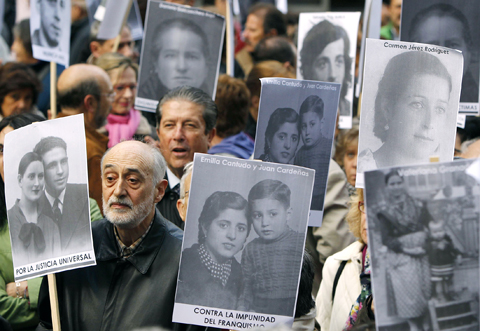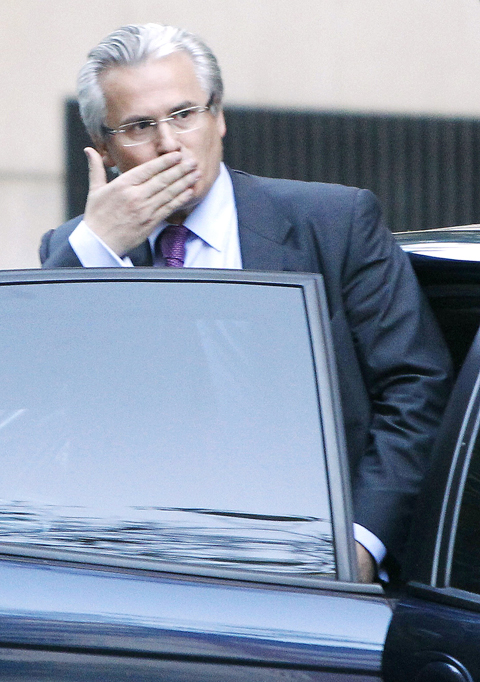The Spanish judge who became an international hero by going after former Chilean dictator Augusto Pinochet and Osama bin Laden was suspended on Friday for allegedly abusing his authority by investigating what is arguably Spain’s own biggest unresolved case: atrocities committed during and after its ruinous Civil War.
The punishment could effectively end Judge Baltasar Garzon’s career.
The unanimous decision by a judicial oversight board, the General Council of the Judiciary, was made during an emergency meeting about Garzon, its spokeswoman, Gabriela Bravo, said.

PHOTO: REUTERS
Supporters chanted, cheered and clapped later as Garzon emerged from the nearby National Court, where he works. He hugged co-workers and appeared to be holding back tears before getting into a bulletproof limousine and riding away.
Garzon, 54, famous worldwide for his cross-border justice cases, has been removed from his post pending his trial on charges of knowingly going beyond the limits of his jurisdiction in 2008 by investigating the execution or disappearance of more than 100,000 civilians at the hands of supporters of General Francisco Franco during the 1936-39 Spanish Civil War or in the early years of the Franco dictatorship.
Until Garzon acted, there had been no official probe of such atrocities, which were covered by an amnesty granted by Spain’s Parliament in 1977, two years after Franco died, as the country moved toward reconciliation.

PHOTO: REUTERS
Spain’s current Socialist government, which has generally been supportive of Garzon, said it respected the judiciary watchdog’s decision but insisted he is innocent until proven guilty.
“The process is not over,” Deputy Prime Minister Maria Teresa Fernandez de la Vega said.
Some say Garzon’s legal woes also have resulted from anger about the way he operated. Fellow judges accustomed to discretion in the judiciary system appeared to be fed up with his aggressive, headline-grabbing style and his status akin to that of a rock star among his most fervent fans, many of them living overseas in areas such as Latin America.
Garzon’s critics also said he had a spotty record in winning convictions in high-profile cases and sometimes cut procedural corners.
The judge is under investigation in two other cases as well: one involving money that a Spanish bank paid to sponsor human rights seminars he gave while on sabbatical in New York a few years ago, and another in connection with jailhouse wiretaps he ordered as part of a probe targeting the conservative opposition Popular Party.
The panel that suspended him on Friday is made up of political appointees and is deeply divided along party lines.
Garzon was indicted last month by the Supreme Court in the civil war case, and this week the court threw out a final appeal that could have spared him from going on trial soon. The judicial oversight body then had no choice but to suspend Garzon.
Even though the decision was widely expected, many in Spain are treating it as marking the end of Garzon’s career, regardless of what the verdict in the trial might be. Garzon’s lawyer, Gonzalo Martinez-Fresneda, said as much a few weeks ago.
Earlier this week, Garzon requested a leave of absence from his post at the National Court to accept a job offer at the International Criminal Court in The Hague. This was seen as an effort to shield himself from suspension.
A subcommittee of the judiciary board met on Friday evening to see if the suspended Garzon can be allowed to take up that job without resigning from his post in Madrid but it postponed a decision.
As the group deliberated, some 500 people gathered outside the National Court to protest the suspension, blocking traffic and chanting slogans against fascism and in support of the judge and justice for the victims of the Franco repression.
Garzon shot to fame after having Pinochet arrested while the aging former despot was visiting London in 1998, and trying in vain to have him extradited to Spain for trial over torture and other abuses committed during his dictatorship in Chile. With that, he was credited with ushering in a new era in international law.
Garzon also indicted bin Laden in 2003, and Spanish colleagues took on cases involving abuses in such faraway places as Tibet and Rwanda.
As a result, Garzon’s name became synonymous with the concept of universal jurisdiction — the idea that some crimes are so heinous they can be prosecuted anywhere. But extraditions have been rare, and there has only been one conviction, that of an Argentine “dirty war” suspect in 2005.
And after receiving complaints from countries targeted in such Spanish probes, such as Israel, Spain changed its law last year so that these cases now require a clear link to Spain, such as Spanish victims.
On Friday, human rights groups lamented how Garzon is being treated.
“Judge Garzon’s suspension will be mourned by human rights activists around the world. Garzon helped to deliver justice for atrocity victims abroad, and now he’s being punished for trying to do the same thing at home,” said Reed Brody, legal counsel for Human Rights Watch.

Kehinde Sanni spends his days smoothing out dents and repainting scratched bumpers in a modest autobody shop in Lagos. He has never left Nigeria, yet he speaks glowingly of Burkina Faso military leader Ibrahim Traore. “Nigeria needs someone like Ibrahim Traore of Burkina Faso. He is doing well for his country,” Sanni said. His admiration is shaped by a steady stream of viral videos, memes and social media posts — many misleading or outright false — portraying Traore as a fearless reformer who defied Western powers and reclaimed his country’s dignity. The Burkinabe strongman swept into power following a coup in September 2022

‘FRAGMENTING’: British politics have for a long time been dominated by the Labor Party and the Tories, but polls suggest that Reform now poses a significant challenge Hard-right upstarts Reform UK snatched a parliamentary seat from British Prime Minister Keir Starmer’s Labor Party yesterday in local elections that dealt a blow to the UK’s two establishment parties. Reform, led by anti-immigrant firebrand Nigel Farage, won the by-election in Runcorn and Helsby in northwest England by just six votes, as it picked up gains in other localities, including one mayoralty. The group’s strong showing continues momentum it built up at last year’s general election and appears to confirm a trend that the UK is entering an era of multi-party politics. “For the movement, for the party it’s a very, very big

ENTERTAINMENT: Rio officials have a history of organizing massive concerts on Copacabana Beach, with Madonna’s show drawing about 1.6 million fans last year Lady Gaga on Saturday night gave a free concert in front of 2 million fans who poured onto Copacabana Beach in Rio de Janeiro for the biggest show of her career. “Tonight, we’re making history... Thank you for making history with me,” Lady Gaga told a screaming crowd. The Mother Monster, as she is known, started the show at about 10:10pm local time with her 2011 song Bloody Mary. Cries of joy rose from the tightly packed fans who sang and danced shoulder-to-shoulder on the vast stretch of sand. Concert organizers said 2.1 million people attended the show. Lady Gaga

SUPPORT: The Australian prime minister promised to back Kyiv against Russia’s invasion, saying: ‘That’s my government’s position. It was yesterday. It still is’ Left-leaning Australian Prime Minister Anthony Albanese yesterday basked in his landslide election win, promising a “disciplined, orderly” government to confront cost-of-living pain and tariff turmoil. People clapped as the 62-year-old and his fiancee, Jodie Haydon, who visited his old inner Sydney haunt, Cafe Italia, surrounded by a crowd of jostling photographers and journalists. Albanese’s Labor Party is on course to win at least 83 seats in the 150-member parliament, partial results showed. Opposition leader Peter Dutton’s conservative Liberal-National coalition had just 38 seats, and other parties 12. Another 17 seats were still in doubt. “We will be a disciplined, orderly